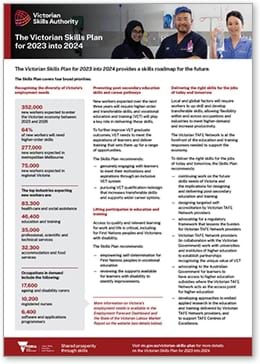This fact sheet provides general summary information about the Victorian Skills Plan 2023 into 2024.
You can download a PDF copy or read an accessible version below.
Also see our other fact sheets related to the plan.
Downloadable fact sheet
(opens in a new window)
Accessible fact sheet
The Victorian Skills Plan for 2023 into 2024 provides a skills roadmap for the future
The skills plan covers four broad priorities
1. Recognising the diversity of Victoria’s employment needs
- 352,000 new workers expected to enter the Victorian economy between 2023 and 2026
- 64% of new workers will need higher-order skills
- 277,000 new workers expected in metropolitan Melbourne
- 75,000 new workers expected in regional Victoria.
The top industries expecting new workers are:
- 83,300 health care and social assistance
- 46,400 education and training
- 35,000 professional, scientific and technical services
- 32,300 accommodation and food services.
Occupations in demand include the following:
- 17,600 ageing and disability carers
- 10,200 registered nurses
- 6,400 software and applications programmers.
More information on Victoria’s employment needs is available in the State of the Victorian Labour Market Report 2023.
2. Promoting post-secondary education skills and career pathways
New workers expected over the next three years will require higher-order and transferable skills, and vocational education and training (VET) will play a key role in delivering these skills.
To further improve VET graduate outcomes, VET needs to meet the aspirations of learners and deliver training that sets them up for a range of opportunities.
The skills plan recommends:
- genuinely engaging with learners to meet their motivations and aspirations through an inclusive VET system
- pursuing VET qualification redesign that increases transferable skills and supports wider career options.
3. Lifting participation in education and training
Access to quality and relevant learning for work and life is critical, including for First Nations peoples and Victorians with disability.
The skills plan recommends:
- empowering self-determination for First Nations peoples in vocational education
- reviewing the supports available for learners with disability to identify improvements.
4. Delivering the right skills for the jobs of today and tomorrow
Local and global factors will require workers to up-skill and develop transferable skills, allowing flexibility within and across occupations and industries to meet higher-demand and increase productivity.
The Victorian TAFE Network is at the forefront of the education and training responses needed to support the economy.
To deliver the right skills for the jobs of today and tomorrow, the skills plan recommends:
- continuing work on the future skills needs of Victoria and the implications for designing and delivering post-secondary education and training
- designing targeted self-accreditation by Victorian TAFE Network providers
- advocating for a regulatory framework that lessens the burden for Victorian TAFE Network providers
- Victorian TAFE Network providers (in collaboration with the Victorian Government) work with universities and institutes of higher education to establish partnerships recognising the unique value of VET
- advocating to the Australian Government for learners to have access to higher education subsidies where the Victorian TAFE Network acts as the access point for higher education
- developing approaches to embed applied research in the education and training delivered by Victorian TAFE Network providers, and to support TAFE Centres of Excellence.
Updated


